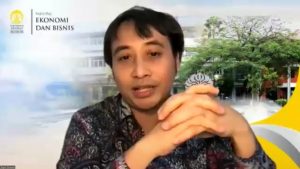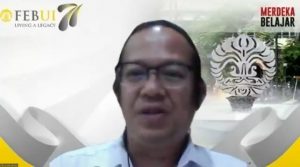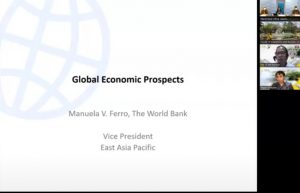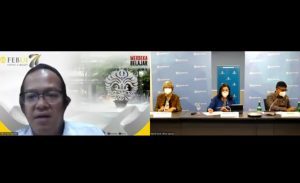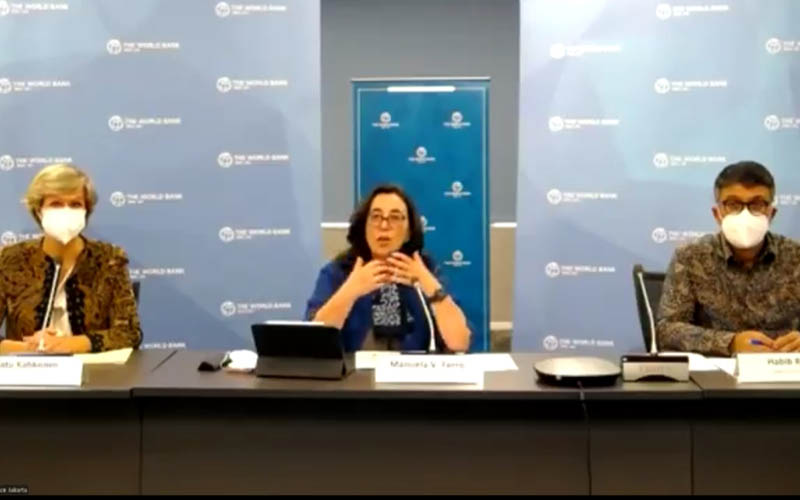General Lecture FEB UI Collaboration The World Bank, “Strengthening Indonesia’s Recovery Amid Global Challenges”
DEPOK – (14/2/2022) The Faculty of Economics and Business Universitas Indonesia in collaboration with the World Bank held a virtual general lecture entitled “Strengthening Indonesia’s Recovery Amid Global Challenges”. The aim of this lecture was to first provide an in-depth overview of global economic challenges the world is facing, particularly due to COVID-19. Secondly, to present an analysis of the implications of these challenges to the Indonesian economy, as evidence that support policy recommendations. The lecture and its following discussion also elaborate steps to take that will ensure Indonesia’s achievement of a strong and sustainable recovery from the pandemic.
This lecture was a closed event, only open to students and teaching staff at FEB UI. Although not open to the public, the event generated significant interest within the FEB UI academic community, as nearly 300 participants, consisting of postgraduate and final year undergraduate students, lecturers, and researchers at FEB UI, alongside World Bank Staff, joined us online.
Within his opening speech, Dr Dartanto highlighted the strong collaboration between the FEB UI and World Bank teams, which enabled the planning and realization of this event. The hope is that this lecture would further cement the spirit of gotong royong (working together) between both FEB UI and the World Bank, to support the development of green and sustainable policies for Indonesia.
Following the Dean’s opening address, Dr Ferro started the lecture session of the webinar by looking in-depth into global trends and economic challenges the world is facing, alongside how policy, in particular monetary and fiscal tools, have responded to these challenges. The lecture also highlighted Indonesia-specific issues, particularly those resulting from the adverse shocks we have experienced due to the pandemic. Dr Ferro noted that Indonesia’s inflation levels have remained within the Central Bank’s target –although not worrisome in the short-run, it is still something to monitor and watch closely. On the fiscal policy side, Indonesia needs to balance two big buckets, by starting to correct and adjust its fiscal policies to respond to the sharp rise in spending and lower revenues Indonesia went through during these past two years.
Directly after Dr Ferro’s rich discussion, Mr Rab, World Bank Lead Economist for Indonesia and Timor-Leste, presented a zoomed-in analysis of the current landscape of the Indonesian economy. Mr Rab delivered key points Indonesia should focus on to prevent temporary shocks faced during the pandemic from turning into a permanent drop. Specifically, urgent attention should be placed on the increase in labour market unemployment and informal work among youth. There is also a risk that this increase may resist, even after the pandemic. High levels of youth who are not in employment, education, and training (NEET) could lead to long term adverse impacts and loss of human capital. To mitigate these challenges three policy options were recommended: (1) focusing fiscal efforts on the health sector and the poor, (2) balancing monetary policy with external financing pressures and (3) shifting drivers of growth from macroeconomic to structural policies.
Following the above lectures, Dr Dartanto provided his insights and responses to preceding presentations. Dr Dartanto started with a note of hope, noting that Indonesia’s economy has started to recover after the devastating impacts of the pandemic. This recovery was due to the combination of good and balanced policy coordination, between both the monetary and fiscal tools the Central Bank and government have implemented. Social mobility in Indonesia has also started to recover, due to, among other factors, significant vaccination intake (now 80% of the population has at least received their first vaccination). This has led to increases in consumer confidence, which has helped the economy to stabilise. To an extent, Dr Dartanto also believes that Indonesia’s recovery was aided by “luck” in the form of an increase in commodity prices, which has led to increases in government revenue.
Because of the above, Dr Dartanto has a positive outlook for Indonesia’s growth in 2022. This positive future is, however, only achievable following the policy recommendations presented by both the World Bank presenters, which is if we pay attention to: (1) global economic uncertainties, (2) exit policies implemented by other countries and Indonesia – if we withdraw too early, this would create unconducive economic trends, but if we are too late, increases in fiscal pressures could lead to systematic risks to our economy, (3) possible scarring effects in the economy and the labour market, and (4) unbalanced economic recoveries among Indonesia’s provinces, which could lead to entrenched inequalities. Importantly, we also need to take into account, in the long term, how we should deal with learning losses due to the pandemic. As we know, unequal access to the internet and devices, has led, in particular, to students from poor families not being able to access and join schooling. This is a significant driver of educational inequalities, which we need to address.
The closing remarks was given by Dr Satu Kahkonen, World Bank Country Director for Indonesia and Timor-Leste. Dr Kahkonen noted that Indonesia is somewhat different from many emerging economies, because the pandemic has been managed macroeconomic-wise, very well. This is due to balanced monetary and fiscal policies implemented in Indonesia. Although Indonesia may still have room to manoeuvre, this space in fiscal and monetary policy is rapidly shrinking. We are thus, only left with structural reforms as a main tool and to reiterate the presentations and comments from Dr Dartanto, which leads us to what we need to focus on.
Dr Kahkonen also agreed with Dr Dartanto on the high risks that learning losses will have on economic recovery. In Indonesia, students have lost on average 0.9 – 1.2 years of learning so far. The pandemic is not over, this is thus, a very big issue that needs to be addressed. We need solutions to make sure learning gets back on track.
Author: DOSPEM-IR and International Office FEB UI
